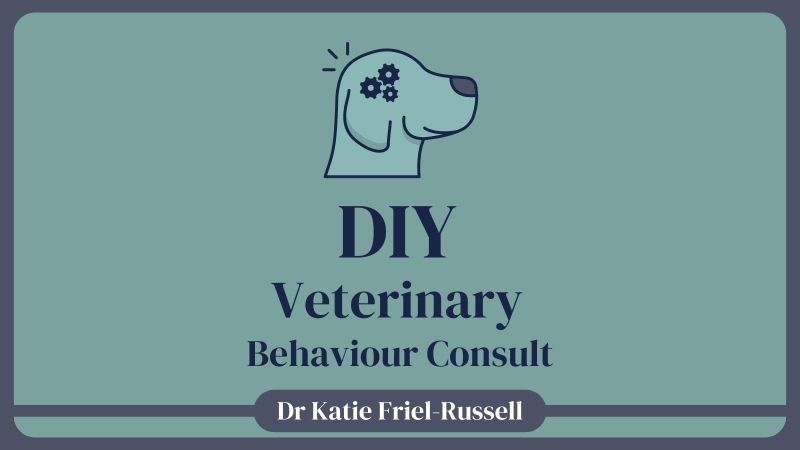#education
Dr Katie Friel-Russell BVSc MAPDT PGDip
CCAB MRCVS
Veterinary behaviour consults for dogs and cats available in person throughout the Midlands, and held via virtual consults nationwide. Direct claims available with all insurance companies.
To access our streamlined referral form please make, or log in, to your Practice Account. Please complete with your practice name and email address.
This also gives you FREE access to all of our Veterinary Behaviour CPD.
Please make an account listing your vet practice under the name and
using your practice's primary email account
Budget friendly option for clients
Coming soon!
DIY Veterinary Behaviour Consult
We now have our affordable DIY option for Veterinary Behaviour support for those clients where referral isn't an option.
Click here soon to find out more about how you can support your clients through our DIY Veterinary Behaviour Consult whilst you complete the medical aspects following guidance in our free Vet DIY Veterinary Behaviour Course.
Click here soon to find out more about how you can support your clients through our DIY Veterinary Behaviour Consult whilst you complete the medical aspects following guidance in our free Vet DIY Veterinary Behaviour Course.

Why refer to a
Veterinary Behaviourist?
Give your clients the best possible care by referring them to a veterinary behaviourist who can treat their pet as a whole. Since the majority of behavioural concerns have an underlying medical component, a thorough understanding of animal health, as well as behaviour, is essential for effective treatment.
Our gold-standard approach combines medical, emotional, and learning-based care to achieve the best results. Dr Katie is fully qualified, independently assessed, and registered with the organisations below.
Our gold-standard approach combines medical, emotional, and learning-based care to achieve the best results. Dr Katie is fully qualified, independently assessed, and registered with the organisations below.
Working together to best support your clients
Working together as a team — with you, your client, and our team — gives the patient the best possible chance at recovery. It’s important that we address any underlying medical factors, alongside the learning and emotional components that impact behaviour.
Referral Reports
Following each Veterinary Behaviour Consult a full referral report will be sent detailing emotional diagnosis and potential medical influences.
Free Behavioural Support
Referring vets are welcome to contact us directly for behavioural support for clients, whether going ahead with referral or not, free of charge.
The majority of pets displaying behavioural concerns have underlying medical factors that must be identified and addressed in order to successfully modify behaviour.
Dr Katie Friel-Russell
"Throughout the whole time Positive Pet Behaviour Vet have been supporting us we have received professional, understanding advice. It's not always the dog that needs support!"
Koko's family
Expert, comprehensive, medical behavioural, collaborative approach.
Support your clients by offering a referral to an ethical, science-based, qualified veterinary behaviourist today.
When to refer a case
Reactivity
Reactions towards people (including handling in the vet practice), dogs or other animals, including resource guarding
Separation
Dogs who struggle being left alone or away from one person
Repetitive Behaviours
Fly snapping, tail chasing, lick granulomas or any other repetitive behaviours
Noise Sensitivity
Dogs that struggle with fear or reactivity to any type of noises
General Anxiety
Those dogs who are generally anxious and struggling with daily life
Impacts on Quality of Life
Any time behaviours are negatively impacting you or your dog's lives
Behavioural Health
Just like physical illness, behavioural issues can cause significant distress and reduce a dog’s quality of life. Anxiety, fear, or frustration can lead to behavioural problems that not only affect the dog’s wellbeing, but also the bond with their family, and behavioural concerns continue to be the most common cause of euthanasia in young dogs.
To truly support a dog’s overall welfare, we must treat behavioural health with the same urgency and care as we do physical health — addressing both is essential to helping them live a safe, happy, and fulfilled life
To truly support a dog’s overall welfare, we must treat behavioural health with the same urgency and care as we do physical health — addressing both is essential to helping them live a safe, happy, and fulfilled life
Write your awesome label here.
